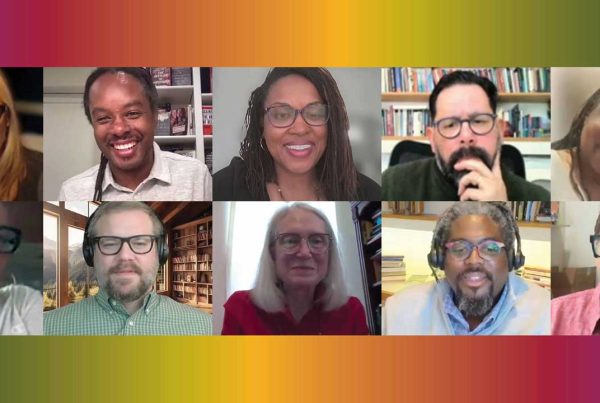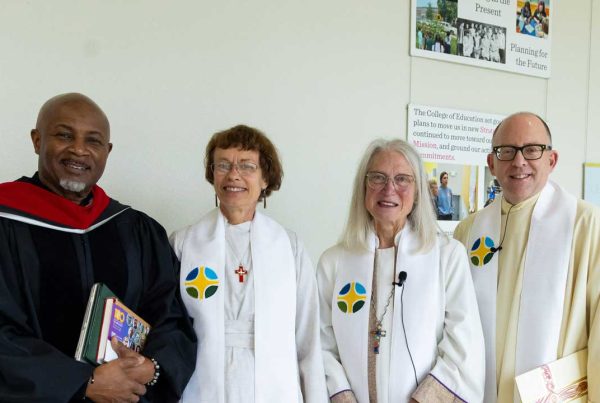Advocacy Training Sessions Highlight Legislative Process
This January, CTS hosted two Advocacy Training Sessions led by Dant Advocacy on how to stay informed regarding Indiana legislation. One session was provided for CTS faculty, staff, students, and alumni, while a second was open to members of our Faith & Action community and local churches. Over 80 people registered, demonstrating how committed the CTS community is to advocacy work and community engagement.
The trainings grew out of an agreement between CTS and Dant Advocacy signed in fall 2023 to help the institution stay informed regarding Indiana legislation that intersects with some of our core values and interests, particularly legislation affecting education, housing, poverty, children, and mental health. While the seminary does have many areas of concern that could intersect with legislative activity, it is not able to actively monitor all of them. Consequently, CTS has chosen to monitor activity that would affect at-risk children and mental health services. Focusing on at-risk children provides a specific window into the key areas that drive poverty in our community, e.g. housing, food, health services, and education. Mental health is also a priority for the seminary, given our counseling programs and Counseling Center.
CTS President Dr. David Mellott shares, “It is imperative that we understand what is happening legislatively and how it might affect our work and our clinicians. In addition to monitoring these areas, CTS will, when it is appropriate and possible, share information with our constituents so that they may express their opinions to lawmakers. Our intention would be to educate, inform, and empower people and communities of faith so that they can pay attention to the actions of policy makers and make their voices heard.”
Efforts to educate our community for legislative engagement will be complemented by efforts to open more direct conversation lines between CTS leadership and legislators in these targeted areas. Dant Advocacy shared with CTS that Indiana legislators say they rarely hear directly from religious leaders, and when they do receive feedback, it is not necessarily from a diverse variety of religious voices. To help address this gap and build paths of interaction and conversation, Dant will also facilitate meetings between CTS leaders and legislators with the intention of opening lines of communication. The hope is that legislators would see the seminary as a resource as they consider bills that intersect with our work and values.
January’s advocacy training sessions took place at CTS and were led by instructor Danielle Coulter (Vice President of Dant Advocacy). Coulter reviewed the Indiana legislative process, highlighting how the system is structured and the most effective ways Indiana residents can engage with their legislators and participate in legislative sessions.
Participants learned:
- How to Identify and contact their state legislators
- How a bill really becomes a law in Indiana
- How to advocate for issues that are important to them
Of particular interest was Coulter’s summary of how a bill is drafted and then moves through the legislative process in Indiana. When a bill is proposed (originating in either the House or the Senate), it is assigned a bill number and begins a long process of review. There is a 1st Reading, Committee action, a 2nd Reading, and a 3rd reading. If a bill successfully moves through these steps of the legislative process in its chamber of origin, it then moves over the next chamber (House or Senate) and must go through the process again.
There are multiple points during the process when members of the public can attend, observe, and participate in this process. The Committee step is very important – this is where advocates have the most influence and ability to speak directly to legislators on the record. Committee hearings are open to the public, which means anyone is allowed to come, sit, and watch. This can be a great entry point of engagement for new advocates who want to get highly involved. Bills that make it through both chambers and any amendment processes then go to conference committee before making it to the Governor’s desk to be signed into law, vetoed, or marked for no action (if the Governor takes no action, after 8 days the bill automatically becomes law).
The training sessions also recognized the reasons advocacy is important, stressing that our legislative process relies on input from stakeholders and constituents. Coulter recognized that while advocacy can seem overwhelming, it is easier than it seems and starts with the simple step of opening the line of communication with your legislators directly – something any resident can do by visiting https://iga.in.gov/information/find-legislators.
If you are interested in advocacy and community engagement, check out the CTS Faith & Action Project and subscribe to our mailing list to be informed of future events like this.






